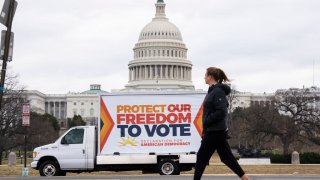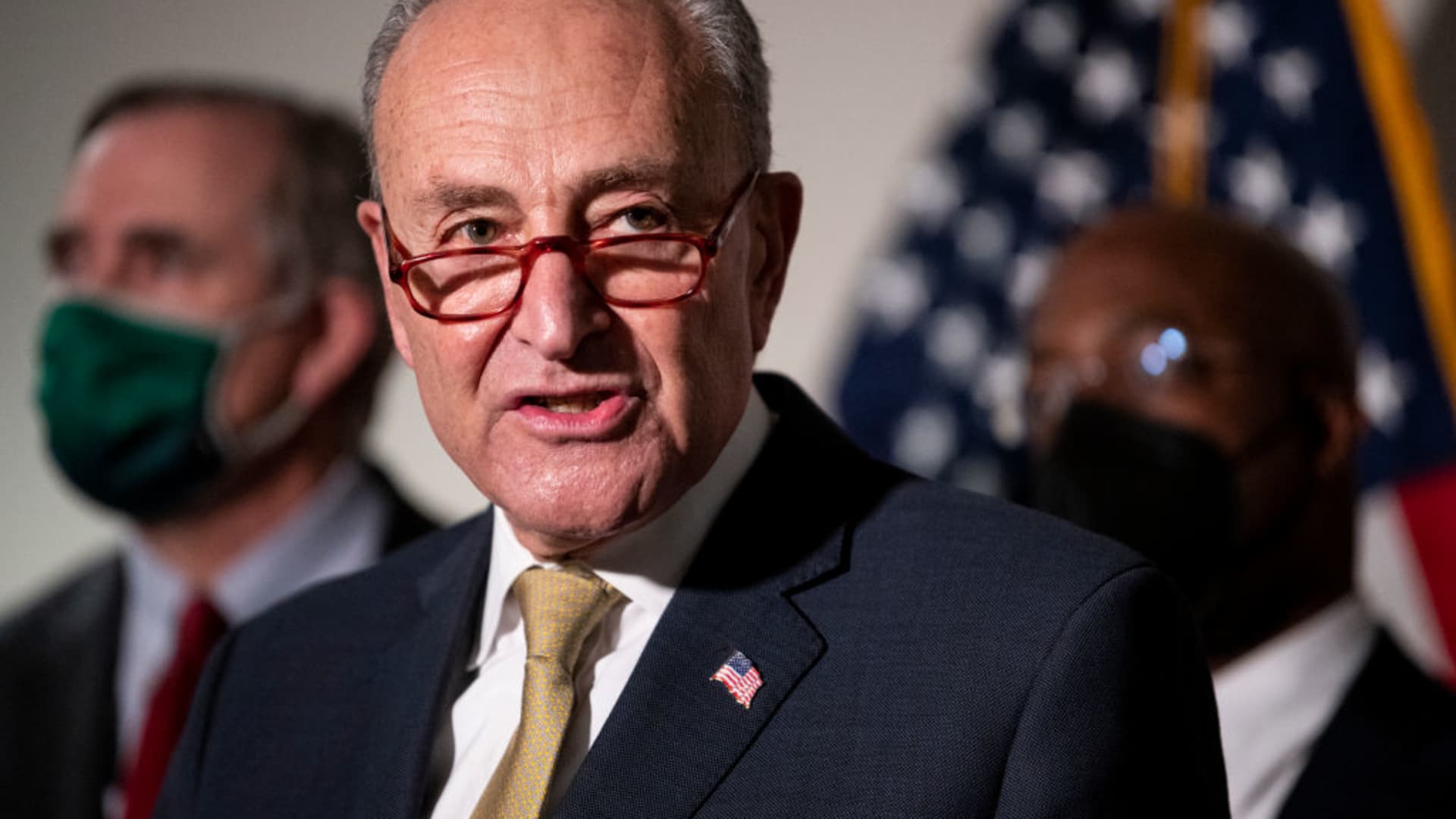
- Senate Republicans blocked voting rights legislation Wednesday night.
- Two Democrats, Kyrsten Sinema and Joe Manchin, then joined the GOP in opposing changes to the chamber’s filibuster rules.
- It is unclear how Democrats will proceed after the votes, though some Republicans have appeared open to reforming the electoral vote counting process.
The Senate on Wednesday night blocked a sweeping pair of voting rights bills and stymied proposed changes to the chamber's rules after months of wrangling over how far Congress needs to go to protect U.S. democracy.
Republicans voted against advancing legislation that would expand early and mail-in voting and make Election Day a national holiday, among a bevy of other reforms. A motion to end debate on the voting rights measure failed in a 51-49 vote. (Senate Majority Leader Chuck Schumer changed his vote to no for procedural reasons.)
Then a long awaited vote on changing Senate rules failed by a 52-48 margin. Democrats Kyrsten Sinema of Arizona and Joe Manchin of West Virginia joined all Republicans in voting not to scrap current filibuster rules.
Get top local stories in Philly delivered to you every morning. >Sign up for NBC Philadelphia's News Headlines newsletter.
The tweak would have required a so-called talking filibuster only for the voting rights bills, forcing GOP senators to actively speak on the Senate floor to block the legislation rather than withhold their support in a vote. If all senators used up their speeches – each would be allowed up to two speeches, with no time limit – the chamber could pass the proposals with a simple majority.

The impasse leaves Democrats no closer to passing election reforms they view as vital to preserving ballot access after GOP-led legislatures in states such as Georgia and Texas approved restrictive voting laws last year. Supporters of voting rights legislation around the country — particularly voters of color who are expected to disproportionately feel the effects of state laws — have urged Democrats to take action before the November midterm elections that will determine control of Congress.
Money Report
"To every member of this body who treasures our precious experiment in self-rule, to every member horrified by the muck of voter suppression, and to everyone who believes this chamber is still capable of defending democracy in its hour of great need, I urge a yes vote," Schumer said Wednesday on the floor of the chamber ahead of the votes.
All 50 senators in the Democratic caucus have backed the voting rights bills before the Senate. They have not agreed on the need to scrap the filibuster to pass them.
Democratic leaders including President Joe Biden, who spent more than 30 years in the Senate, have urged the party to get behind the proposed rules changes.
In a statement following the votes, Biden said he is "profoundly disappointed that the United States Senate has failed to stand up for our democracy."
He said his administration "will explore every measure and use every tool at our disposal to stand up for democracy."
It is unclear now how Democrats will proceed. Some Republicans have sounded open to reforming the process of counting electoral votes after a presidential election to make it harder to overturn a result.
Changes to the Electoral Count Act would respond specifically to efforts by former President Donald Trump and his allies to reverse Biden's 2020 presidential election victory based on false claims of widespread cheating.
After courts rejected Trump's repeated efforts to overturn state results, his allies pressured former Vice President Mike Pence to step in when Congress counted electoral votes on Jan. 6, 2021, the day a mob of Trump supporters overran the Capitol and delayed the transfer of power.
Pence did not try to reverse the presidential result. But the effort by Trump and his allies raised the specter of officials trying to overturn future elections.
Biden said Wednesday that he has "no reluctance to reach out to any Republican" about reforms to counting electoral votes.
Republicans have opposed any legislation that would create more federal guidelines for how states run elections. They have also warned that getting rid of the filibuster would affect how the Senate functions for years to come.
"Today the Senate will need to prevent this factional frenzy from damaging our democracy, damaging the center and damaging our republic forever," Senate Minority Leader Mitch McConnell said Wednesday.
Democrats tried to advance legislation that contains two voting rights bills, the Freedom to Vote Act and the John Lewis Voting Rights Advancement Act.
The first proposal would expand early and absentee voting and make automatic voter registration the national standard. The plan aims to make it easier to comply with state voter ID laws and would restore incarcerated people's right to vote after their sentences end.
It would also enshrine Election Day as a national holiday.
The second bill named for the late civil rights activist and congressman aims to restore parts of the Voting Rights Act of 1965 gutted in a 2013 Supreme Court decision. Shelby County v. Holder invalidated the piece of the law that required certain jurisdictions with a history of racial discrimination to get the Justice Department's approval before changing voting rules.
Sen. Raphael Warnock, a Georgia Democrat and one of three Black senators, disputed GOP arguments that a new federal voting law would infringe on state power to run elections by noting that states' rights were cited in past justifications for discriminatory policy in some of the "darkest moments" for the U.S.
"Taking action to pass voting rights legislation is not a policy argument," he said. "It is about democracy itself."






